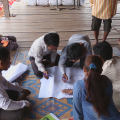SUMERNET 4 All: Engaging with water insecurity in the Mekong Region
Overview
The Mekong Region continues its drive towards regional economic integration and a gradual shift towards more open political systems and a market economy. But poverty and social inequality – including gender inequality – remain significant concerns in the region. Sustainable development is a major challenge as environmental degradation takes a toll on both ecosystems and livelihoods, and competition over limited natural resources becomes increasingly common, often cutting across national boundaries.
The policy choices made today are thus crucial to ensuring socially inclusive, equitable and sustainable development in this region.
The Sustainable Mekong Research Network (SUMERNET), an initiative for research and policy engagement bringing together 70 research and policy partners, aims to support the sustainable development of the Mekong Region through scientifically robust, policy-relevant research and outreach.
In Phase 4 of its programme (2019-2027), titled SUMERNET 4 All, the network will focus on water insecurity throughout the Mekong Region by linking evidence-based research on regionally relevant water issues and engaging with policy, local community and vulnerable groups across the region.
SUMERNET 4 All
SUMERNET was launched in 2005, supported by the Swedish International Development Agency (Sida). Membership has grown from the initial 14 to 70 organizations comprising academics, government line agencies, independent research institutions and international organizations.
SUMERNET supports policy-relevant research and outreach activities to inform and engage decision-makers, planners and stakeholders bringing together research partners engaged in sustainable development in the six countries of the Mekong Region: Cambodia, China (specifically Yunnan Province and Guangxi Zhuang Autonomous Region), Lao PDR, Myanmar, Thailand, and Vietnam. Within this context, it pursues an evolving agenda in response to questions and policy issues that arise in the region.
In this present 4th phase called SUMERNET 4 All, the network will focus on reducing water insecurities for all, in particular, the poor, marginalized and socially vulnerable groups of women and men in the Mekong Region.
This new phase of SUMERNET 4 All will continue working towards sustainable development of the Mekong Region by putting knowledge-based policy engagement at the heart of its activities.
SUMERNET 4 All has the mission “to improve the policies and practices in reducing water insecurity by conducting collaborative research, engaging in the policy process, and promoting scientifically sound research and innovation while considering gender and social equality, human rights, conflict sensitivity, environmental integrity and poverty reduction in the Mekong Region.”
Our overarching mission is to improve policies and practices in the Mekong Region that reduce water insecurities in ways that are gender- and socially-responsive by: conducting collaborative research; engaging in the policy process; promoting scientifically sound research and innovation.
Water insecurity is defined as “not having the rights or access to sufficient water of adequate quality or being made increasingly vulnerable to unacceptable levels of water-related risks.” Water insecurity has important implications for health and wellbeing, gender equality, as well as livelihoods, income generation and productivity. Water insecurity is multi-scale: spatially, it may be applied to individuals, households, communities, nations and region; temporally, it may refer to just a particular time of year or season with high risks, or it may apply to entire years or decades, in particular under impacts of climate change which are highly uncertain.
Key research themes
In response to changing demands and policy debates in the Mekong Region, SUMERNET 4 All will focus on three research themes:
- Water access, rights & allocation in times of scarcity. Improve understanding of how development policies, projects and practices influence water insecurities that affect urban and rural livelihoods; agricultural water productivities; viability of fisheries and aquaculture; and ecosystem integrity during seasons and years when water is scarcest, in particular under climate change.
- Governance and management of flood disaster risks. Improve understanding of the impacts of water-related disasters in urban and rural settings and the effectiveness of risk reduction measures and decisions, on human insecurities and ecosystems under current and plausible future climate conditions.
- Transboundary interactions with water systems. Improve understanding of international transboundary interactions among the water, energy and food production systems including the impacts of hydropower dams and irrigation schemes.
Policy engagement
SUMERNET promotes the use of scientific knowledge in policy-making not just by producing policy-relevant research, but also by engaging development actors, decision-makers and other stakeholders directly in the research process. Engagement with these actors, whom we call ‘boundary partners’, is built into SUMERNET’s research activities, which helps ensure that the work is aligned with our boundary partners’ priorities and can be effectively integrated into their plans and programmes. Boundary partners also include actors active in promoting a gender policy lens to sustainable development, and thus would include gender/feminist organizations and individuals whose work is committed to building a democratic, inclusive and just Mekong future.
SUMERNET’s boundary partner model has led to the strategic engagement of decision-makers and influencers at all stages of research and dissemination, making SUMERNET research credible and policy-relevant. Boundary partners and other stakeholders are also engaged through media, communication and dialogue activities such as policy forums that will consciously integrate gender and social analyses and issues.
SUMERNET monitors emerging regional policy issues so that it can anticipate and be responsive to knowledge demands. The rapid development of the Mekong Region makes it essential that SUMERNET maintain a degree of flexibility to reorganize around emerging issues. SUMERNET’s structure is highly inclusive: partners can propose new strategic directions for the network to consider by the SUMERNET Steering Committee. This ensures that SUMERNET’s work remains directly relevant and driven by the region.
Knowledge outputs
Below is a selected list of recent outputs from SUMERNET
Journal Articles
Ainsley, S. et al. 2018. Fish species diversity and fisheries resources from wetlands in Kulen Promtep Wildlife Sanctuary, Cambodia, Cambodian Journal of Natural History, Volume 2018 No. 1. Centre For Biodiversity Conservation Royal University of Phnom Penh.
Nguon, P. et al. (2018) Co-production of salient, credible and legitimate environmental knowledge: Cambodia National REDD+ Strategy. Journal of Sustainability Science. Springer.
Kusakabe, K. and Myae, Aye C. (2017) Precarity and Vulnerability Under Expansion of Rubber Plantation in Northern Laos and Northern Shan State. Journal of Contemporary Asia. Routledge.
Elazegui, D.D., Maria Ana T. Quimbo, and S.G. De los Santos (2016) Adaptation Pathways for Climate-Resilient Development: Lessons from Selected Local Government Units in Central Luzon, Philippines. Journal of Development Policy Review. Wiley-Blackwell on behalf of the Overseas Development Institute.
Books, book chapters and policy briefings
Trung N.H., Duc N.H., Loc N.T., Tuan D.D.A., Thinh L.V., Lavane K. 2019. Urban Water Management Under Uncertainty: A System Dynamic Approach. In: Stewart M., Coclanis P. (eds) Water and Power. Advances in Global Change Research, vol 64. Springer, Cham.
Krittasudthacheewa C., Hap, N., Bui, D.T., and Voladet, S. (eds.). (Forthcoming 2019). Addressing the Impacts and Uncertainties in Development and Climate Change in the Mekong Region. SIRD, Selangor, Malaysia.
Nguyen, V. K., & Howie, C. (Eds.). 2018. Conservation and Development of the Floating Rice Based Agro-Ecological Farming Systems in the Mekong Delta. Agricultural Publishing House, Hanoi.
Lebel, L., Hoanh, C.T., Krittasudthacheewa, C., Daniel, R. (Eds.). 2014. Climate risks, regional integration and sustainability in the Mekong region. SIRD,Selangor, Malaysia.
Daniel, R., C. Grünbühel, V. Hongsathavij (eds.) SUMERNET Research Projects: Policy Briefings Phase 3 (2013-2018). SEI Asia, Bangkok, Thailand.
Multimedia
SUMERNET film series on “Climate change and water insecurity”, 2018. Producer: Rajesh Daniel, SEI Asia, Bangkok, Thailand.
- The Last Drop (~7 mins., Myanmar with Eng. subtitles).
- This Shifting Ground (~7 mins., Myanmar with Eng. subtitles).
- Burning dilemmas (~12 mins in Thai with Eng. subtitles).
- Protecting the wetlands of Kulen Prom Tep (~12 mins., Khmer with Eng. subtitles).
- Assessing the wetlands of Kulen Prom Tep (~15 mins., in Khmer and English).
- Floods, pollution and water insecurity in Can Tho (~12 mins., in Vietnamese with Eng. subtitles).
- Co-generating knowledge: Organic rice in Savannakhet (~12 mins., in Lao with Eng. subtitles).
Related Publications
-
![SUMERNET Vision Guide 2019 – 2028]()
SUMERNET Vision Guide 2019 – 2028
-
![Strengthening groundwater governance in rapidly urbanizing areas of the Lower Mekong region]()
Strengthening groundwater governance in rapidly urbanizing areas of the Lower Mekong region
-
![SUMERNET Mekong Media-Research Partnership 2021-2022]()
SUMERNET Mekong Media-Research Partnership 2021-2022
-
![SUMERNET Talent Book]()
SUMERNET Talent Book
-
![Interventions and pathways to reducing water insecurities in the Mekong region: insights from SUMERNET 4 All (S4A) research]()
Interventions and pathways to reducing water insecurities in the Mekong region: insights from SUMERNET 4 All (S4A) research
Latest Stories
-
SUMERNET Vision Guide introducing the new phase "SUMERNET 4 All"
The new, revised "Vision Guide" for SUMERNET is now available. This vision guide presents an overview of SUMERNET - its origins and governance structure, background to the network, aims, key research areas, engagement with policy, and outreach products
![SUMERNET Vision Guide introducing the new phase "SUMERNET 4 All"]()
-
SUMERNET 4 All Call for Proposals on Joint Action
SUMERNET 4 All (S4A) provides financial support and technical assistance to consortia of researchers and boundary partners from the Mekong Region
![SUMERNET 4 All Call for Proposals on Joint Action]()
-
SUMERNET launches redesigned website to provide a fresh visual look and direction
SUMERNET is proud to announce the launch of our redesigned website to coincide with our new phase of work on addressing water insecurity in the Mekong Region.
![SUMERNET launches redesigned website to provide a fresh visual look and direction]()









 Read more about SUMERNET
Read more about SUMERNET
